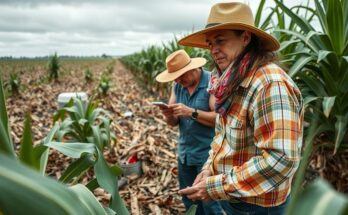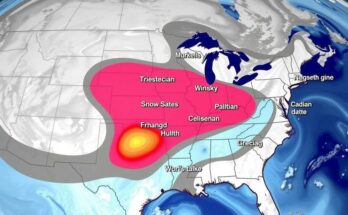Tropical Cyclone Chido struck Mozambique on December 15, 2024, causing severe rainfall and destruction, affecting at least 174,000 people. With $4 million allocated for emergency response, the cyclone led to significant casualties and property damage, particularly in Cabo Delgado and Nampula provinces. A joint effort is underway to assess needs and coordinate humanitarian aid, emphasizing the urgent need for medical supplies and support for vulnerable populations.
On December 15, 2024, Tropical Cyclone Chido inflicted devastating impacts upon Mozambique, with reported rainfall exceeding 250 mm within a 24-hour period and wind speeds reaching 120 km/h. Following its landfall, the cyclone progressed westward into Malawi on December 16 and is anticipated to dissipate near Zimbabwe by December 17. The provinces of Cabo Delgado, Nampula, and Niassa were the most severely affected, with reports indicating that at least 174,158 individuals have been impacted, including significant property damage and fatalities. The Emergency Relief Coordinator has allocated $4 million in support of early humanitarian efforts to address the urgent needs of affected populations.
Initial assessments revealed that more than 35,000 houses had been completely or partially destroyed, alongside the destruction of schools, health facilities, and essential infrastructure. In Cabo Delgado Province, substantial damage was reported in districts such as Mecufi and Chiure, where 60% of homes lost roofs and 100% of structures were compromised in other areas. A joint multi-agency assessment identified critical protection issues, especially concerning vulnerable populations who require safe spaces and protection measures. The provision of dignity kits for women and girls and emergency health supplies is paramount to support survivors.
The severity of the cyclone’s impact extends beyond physical destruction; a community health crisis is emerging, exacerbated by insufficient medical supplies and inadequate shelter. Vulnerable individuals, particularly women and children, require immediate registration and assistance to ensure they receive the support necessary for recovery. As the situation continues to evolve, local authorities and humanitarian agencies are on the ground conducting assessments to coordinate response efforts effectively and mitigate further challenges arising from potential disease outbreaks, such as cholera, which have already been reported in affected regions. The established collaborative efforts among various governmental and non-governmental entities will play a crucial role in rebuilding the affected communities.
On December 15, 2024, Tropical Cyclone Chido made landfall in Mozambique, becoming one of the most intense weather systems to affect the region in recent years. This cyclone was marked by extreme weather conditions, including record rainfall and ferocious winds, leading to widespread devastation. The emergency response has been hindered by limited supplies and the scope of the damage has forced humanitarian agencies to rapidly mobilize resources. With over 174,000 people reported affected, the response initiatives focus on safety, security, and the urgent provision of essentials to the impacted populations. The continuous reporting from the National Institute for Disaster Management in Mozambique (INGD) emphasizes the need for detailed assessments and coordinated relief efforts.
In conclusion, Tropical Cyclone Chido has inflicted significant damage across Mozambique, particularly in the provinces of Cabo Delgado, Nampula, and Niassa. Despite the allocation of $4 million in relief, the needs are vast, as many communities face destruction of homes and essential infrastructure. Urgent action is necessary to address health crises, support displaced populations, and implement protection measures for the most vulnerable individuals. Continuing efforts from both local and international responders will be essential in facilitating recovery and rebuilding efforts in the affected areas.
Original Source: www.unocha.org




